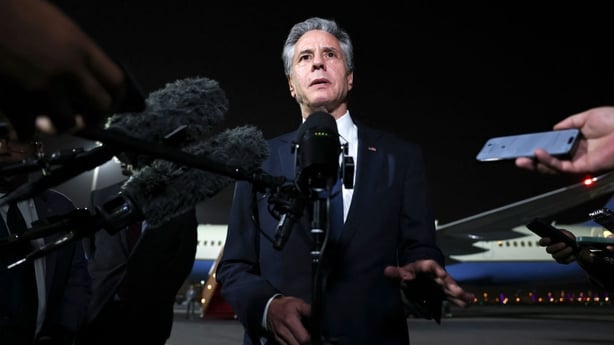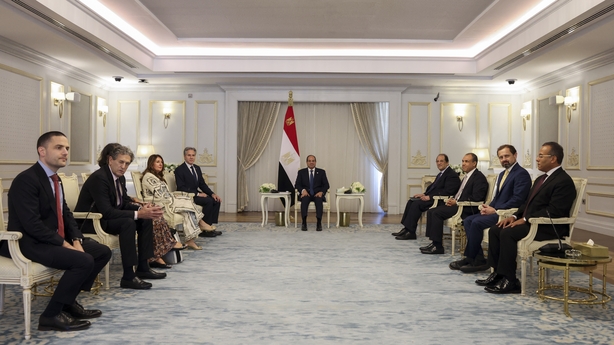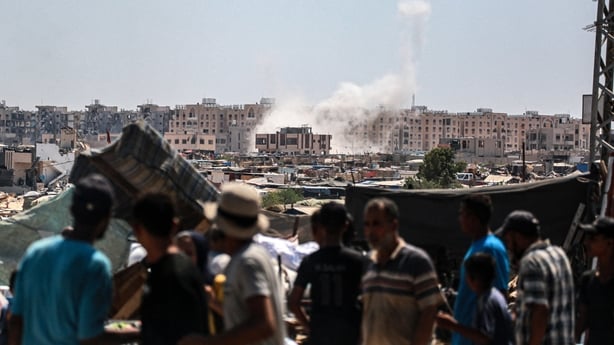US Secretary of State Antony Blinken has said there is no time to waste to reach a ceasefire agreement in Gaza as he wrapped up a Middle East tour.
"Time is of the essence" for a deal, he told reporters at Doha airport in Qatar as he prepared to fly back to Washington, adding that the United States rejects a "long-term" Israeli occupation of the territory.
Mr Blinken held a series of engagements today as part of the latest diplomatic push to secure an agreement, despite major areas of dispute between Israel and Hamas.
He first met Egypt's President Abdel-Fattah El-Sisi in the coastal town of Alamein. Egypt has been helping mediate the on-off Gaza talks for months along with the US and Qatar.
Speaking after the meeting, President Sisi said that it was time to put an end to the ten-month-old war and warned of the conflict expanding in the region.
Mr Blinken, who is on his ninth visit to the region since conflict broke out between Israel and Hamas in October, later travelled to Doha to hold talks with Qatari Minister of State Mohammed bin Abdulaziz Al Khulaifi.
A plan for the diplomat to meet Emir Tamim bin Hamad Al Thani was scrapped, a senior US official said, as Mr Al Thani was unwell.

Yesterday, Mr Blinken confirmed that Israeli Prime Minister Benjamin Netanyahu had accepted a US "bridging proposal" aimed at narrowing the gaps between the two sides, after talks last week paused without a breakthrough, and urged Hamas to back it too.
A senior US government official told reporters travelling with Mr Blinken that Washington expects ceasefire talks to continue this week.
The Palestinian militant group has not explicitly rejected the proposal.
However, Hamas said it overturns what was previously agreed, without giving specifics, and accused Israel and its US ally of spinning out negotiations in bad faith.
At stake is the fate of tiny, crowded Gaza, where Israel's military campaign has killed more than 40,000 people since 7 October, according to Palestinian health authorities, and of the remaining hostages being held there.
We need your consent to load this rte-player contentWe use rte-player to manage extra content that can set cookies on your device and collect data about your activity. Please review their details and accept them to load the content.Manage Preferences
The war began when Hamas gunmen stormed into Israeli communities, killing around 1,200 people and around about 250 hostages, according to Israeli tallies.
Israel's military said today that it had recovered the bodies of six hostages from southern Gaza.
Some 109 hostages remain in the Palestinian territory, according to Israeli authorities, around a third of them believed to be dead.
In Gaza, Israeli forces battled Hamas-led militants in central and southern areas, and Palestinian health authorities said at least 39 people had been killed in Israeli strikes, including on a school housing displaced people.
Israel's military said it had struck Hamas militants embedded in the building.
Gaza's Hamas-run health ministry said it still waiting for polio vaccines to arrive after the disease was discovered in the territory, where most people live in tents or shelters without proper sanitation.
It echoed a call by the United Nations last week for a ceasefire to allow the vaccination campaign.

Mr Blinken has called the latest push for a deal "probably the best, possibly the last opportunity" and described his meeting with Mr Netanyahu as constructive.
Officials from the US Hamas, Israel, Egypt or Qatar have not spelled out what is in the proposal or how it differs from previous versions.
Hamas rejected US comments that it was backing away from a deal, saying Egyptian and Qatari mediators knew it had dealt positively in relation to the negotiations and that it was Mr Netanyahu who had obstructed an agreement with new demands.
The militant group said it is committed to terms it agreed with mediators last month based on a proposal made by the US in May.
Mr Netanyahu denies obstructing a deal.
Months of on-off talks have circled the same issues, with Israel saying the war can only end with the destruction of Hamas as a military and political force and the group saying it will only accept a permanent, not temporary, ceasefire.
The US official said that even if Hamas was to agree on the bridging proposal immediately, there would have to be additional conversations to iron out details on implementation of the deal.
"As these conversations will continue, part of the next step - if Hamas were to also accept this bridging proposal - is that discussions will continue on some of the more technical and implementing details," the official said.

There are disagreements over Israel's continued military presence in Gaza, particularly along the border with Egypt, the free movement of Palestinians inside the territory and the identity and number of Palestinian prisoners to be freed in a swap.
Egypt is particularly focused on a security mechanism for the Philadelphi Corridor, the narrow border strip between Egypt and Gaza that Israeli forces seized in May.
Both Hamas and Egypt oppose Israel keeping troops there, but Mr Netanyahu has insisted they are needed to stop weapons being smuggled into Gaza.
The senior US official disputed an Axios report that quoted the Israeli leader as saying he may have convinced Mr Blinken on the point.
Egyptian security sources said the US has proposed an international presence in the area, a suggestion the sources said could be acceptable to Cairo if limited to a maximum of six months.
"The ceasefire in Gaza must be the beginning of broader international recognition of the Palestinian state and the implementation of the two-state solution, as this is the basic guarantor of stability in the region," President Sisi said after meeting Mr Blinken.

